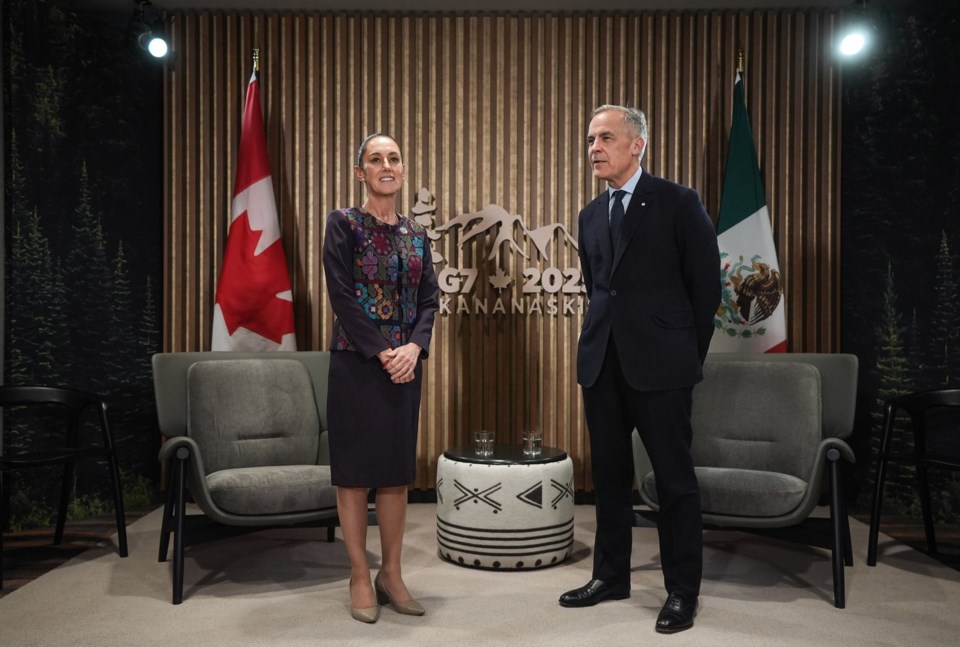OTTAWA — Days after the United States hit Canada with higher tariffs, Prime Minister Mark Carney said Tuesday that he will speak with U.S. President Donald Trump "when it makes sense."
"I haven't spoken to the president in recent days," Carney said during a press conference in West Kelowna, B.C.
When asked Thursday about the prospects for a trade deal with Canada, Trump said that "he's called" — seemingly a reference to Carney.
The U.S. hit Canada on Friday with a 35 per cent tariff on goods not compliant with the Canada-United States-Mexico agreement on trade, known as CUSMA. Tariff rates for Canadian steel, aluminum and copper are at 50 per cent.
Carney said this means that 85 per cent of trade between the Canada and the U.S. remains tariff-free.
CUSMA is scheduled for a mandatory review next year.
During Tuesday's press conference to discuss supports for the softwood lumber industry — a sector hit hard by American tariffs — Carney pointed to Canada's large investment footprint in the U.S.
While other countries have included multi-billion dollar investment pledges in their trade deals with the U.S., Carney suggested that Canadian investment in the U.S. likely will decrease without a deal.
"We have 40 million people. We are the second-largest investor in the United States in the world," he said.
"Without an agreement, there will be less by definition."
While Trump has cited cross-border fentanyl trafficking to justify some of his tariffs, Carney said that drugs flowing from Canada to the U.S. amount a "rounding error" compared to other sources.
American border agents have seized about 34 kilograms of fentanyl at the Canadian border this fiscal year, compared to over 4,000 kilograms at the Mexican border, according to U.S. Customs and Border Protection data.
Canada is looking around for trade partners it can "trust," Finance Minister François-Philippe Champagne said Tuesday as he and Foreign Affairs Minister Anita Anand met with Mexico's President Claudia Sheinbaum.
Anand and Champagne flew to Mexico Monday to talk economic growth, trade and security with the Mexican president. Carney is expected to visit Mexico to meet with Sheinbaum soon.
In a media statement, Champagne said this visit is part of a broader strategy of diversifying Canada's trading relationships as the United States takes a protectionist, tariff-focused approach.
"As we strive to provide more certainty and diversify our export markets, forging closer partnerships like the one we enjoy with Mexico is how we chart a new way forward with partners we can trust," he said.
The ministers are expected to hold a virtual press conference from Mexico Tuesday at 6:00 p.m. EDT.
While Canada is now under the increased U.S. tariff rate that took effect Aug. 1, Mexico received a 90-day reprieve from threatened higher U.S. levies.
Ontario Premier Doug Ford last year called for a bilateral trade deal between Canada and the United States because he said Mexico was serving as a back door for Chinese auto parts and vehicles entering the North American market.
The automotive sector is one of the biggest drivers of trade between Canada and Mexico. Vehicles and auto parts account for 20 per cent of Canada's exports to Mexico and 37 per cent of Canadian imports from its southern partner, according to Economic Development Canada.
The auto sector has been a key target of Trump's tariffs. The North American automotive supply chain is spread between the three countries and Trump has said he wants to build up end-to-end auto manufacturing in the U.S.
Mexico is one of Canada's biggest trading partners for various commodities, including oil and gas, steel and aluminum.
Canada's imports from Mexico include tropical fruits, broadcast equipment and medical devices, according to Mexico's economy ministry.
Anand and Champagne are also scheduled to meet with Canadian and Mexican business leaders after their Tuesday press conference. A finance official said this meeting includes representatives from the banking, mining, aerospace, railway, pension, pharmaceutical and agri-food sectors.
This report by The Canadian Press was first published Aug. 5, 2025.
David Baxter, The Canadian Press




